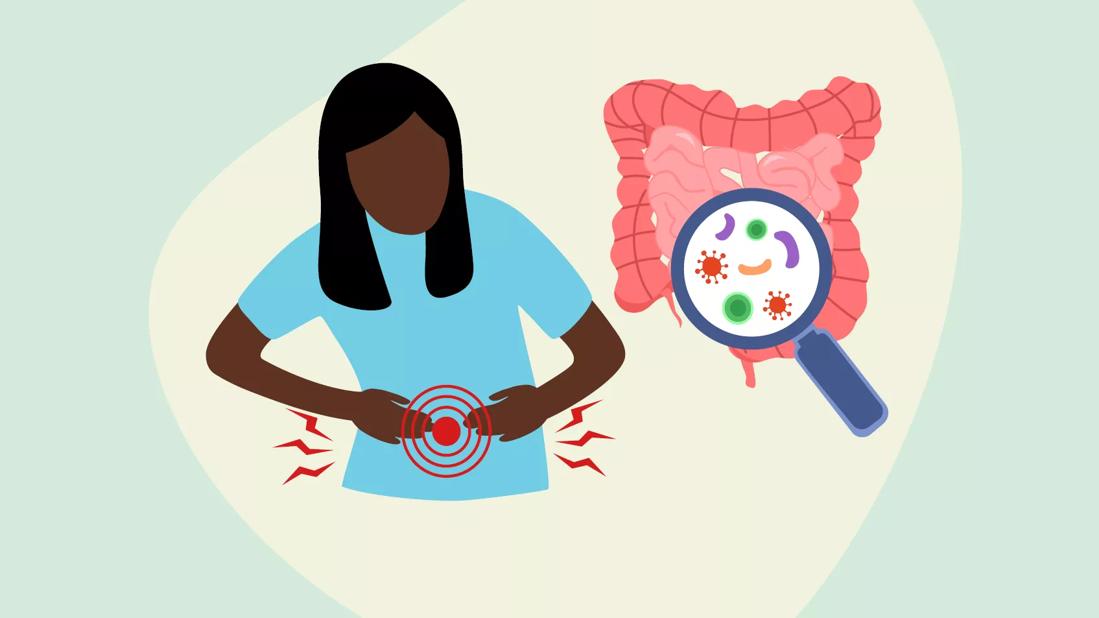Food poisoning typically passes within 12 to 48 hours, with symptoms including diarrhea, nausea, stomach pain and vomiting

Bad shellfish. Undercooked chicken. Leftover rice or pasta. That salad bar you sidled up to for lunch, knowing it looked suspicious, but also knowing you needed a bite if you were going to make it through your afternoon meetings.
Advertisement
Cleveland Clinic is a non-profit academic medical center. Advertising on our site helps support our mission. We do not endorse non-Cleveland Clinic products or services. Policy
And now, you’re on the bathroom floor, regretting every decision you’ve ever made. Swearing off food altogether and wondering how your stomach could even hold so much ick.
Food poisoning ranks up there as one of the most miserable of human experiences, but it’s not uncommon. The Centers for Disease Control and Prevention (CDC) estimates that each year, 48 million people in America get sick from a foodborne illness.
We talked with gastroenterologist Christine Lee, MD, about where food poisoning comes from, how long it lasts and what you can do to get better fast.
“Most of the time, food poisoning will set in within a few hours of eating contaminated food,” Dr. Lee says. “The severity of your symptoms and how long it will last is mostly dictated by what strain of germs you ingested, how much you were exposed to and how strong your immune system is to fight it off.”
Most common types of food poisoning will take four hours to 24 hours after eating to set in, but it’s not always so quick. Some foodborne illnesses are latent, meaning they reproduce in your system before you ever feel any symptoms. Hepatitis A virus, for example, can take 15 days to 50 days before rearing its ugly head.
Everyone reacts differently to the viruses, bacteria and parasites that lead to food poisoning. So, even if you and your family all eat the same contaminated meal, your results may vary.
Advertisement
Dr. Lee reiterates: “Several factors will play into how sick you’ll get and for how long. Your illness will depend on what the culprit is, how much was consumed and how your individual immune system reacts.”
Most of the time, food poisoning will pass within 12 hours to 48 hours in healthy people. That’s how long it takes for a healthy body to purge most foodborne infections.
But your length of illness can vary based on several factors.
“Depending on the pathogen and your body’s reaction to it, some people can be ill with food poisoning for 10 days or even more,” Dr. Lee notes. “The bacteria campylobacter, for example, can produce symptoms for weeks.”
Some foodborne illnesses require antibiotics. Talk with your doctor if your symptoms last longer than two days.
The effects of food poisoning usually come on suddenly and take over completely until you’ve expelled the offending germs from your body. Your symptoms can be dramatic and even dangerous. The CDC estimates say that each year, 128,000 people are hospitalized and 3,000 people die from foodborne illnesses.
The most common symptoms of food poisoning include:
These uncomfortable symptoms of food poisoning are your body’s way of working to return you to health by purging any offending toxins from your body. It’s not pretty, but it’s actually your body taking care of you and doing what it has to do to make you well again.
Dr. Lee says there are more than 250 kinds of disease-causing germs — bacteria, viruses and parasites — that can make their way into your food and make you ill. Harmful toxins and chemicals also cause foodborne illness.
She adds that food poisoning can come from just about anything you eat. It’s not only the questionable street vendor that, in hindsight, should have been an obviously poor choice. Foods that wouldn’t have thrown up any red flags can still be contaminated.
“You get food poisoning from eating or drinking food that is contaminated with pathogenic viruses, bacteria, toxins, parasites or toxic chemicals,” Dr. Lee explains. “It doesn’t always come from rotten or spoiled food. It could come from perfectly good food that was just improperly handled or cooked poorly.”
While food poisoning can be miserable, it usually doesn’t require medical intervention for otherwise healthy people.
“For most people with healthy immune systems, you can usually recover from food poisoning on your own. As long as you’re able to keep food or liquids down, you can try to hydrate at home and let it run its course,” Dr. Lee says.
Advertisement
When you’re down with food poisoning, avoiding dehydration is your No. 1 job. You need to replenish the liquids lost from vomiting and diarrhea.
“You want to drink lots of fluids, and not just water,” Dr. Lee says. “If you’re ill and you’re losing a lot of water through diarrhea, or if you have a fever and you’re sweating, the best replenishment would be something with salt, sugar or electrolytes in it, like Gatorade®, broth, ginger ale or juice.”
When you consume these drinks, you tend to keep them in your body — they’re less likely to just run off or go straight to your kidneys where you’ll urinate them right out.
Consult your physician if you have a medical condition that limits your sodium consumption, such as heart, liver or kidney disease.
Start with small sips to make sure it stays down. Big gulps are more likely to get your belly all in a tizzy and come right back up. And keep your drinks at room temperature. Cold beverages can be a bad shock to an upset stomach.
If you’re feeling up for it, try to nibble on some small, bland foods to settle your stomach. Dr. Lee recommends the BRAT diet, which emphasizes:
Other easy-on-the-stomach staples are broth, chicken noodle soup, rice pudding, oatmeal, potatoes and crackers. You’ll want to stay away from food that is more challenging for your digestive tract to digest, like greasy, fried or spicy foods.
Advertisement
If food isn’t treating you well for a bit, that’s OK. Take it slow and don’t try to force down food if it’s not time yet.
Bismuth subsalicylate (aka Pepto Bismol®) is generally fine to take. It has soothing and anti-inflammatory effects. Dr. Lee says to remember that it is likely to turn your stool black due to certain chemicals it contains. (While it can be alarming if you’re not expecting it, this is normal.)
As for diarrhea medication, Dr. Lee advises letting nature run its course.
“I would not recommend taking something like loperamide (Imodium®) to stop diarrhea. While it’s unpleasant, it’s better to expel the toxin out of your system rather than keep it in.”
Remember, keeping hydrated is your top priority when you’re dealing with food poisoning.
“If your nausea is so severe that you’re unable to keep any fluids down, you need to seek medical help,” Dr. Lee stresses. “IV fluids can be administered for hydration and to replete lost electrolytes.”
You should also see a doctor if you:
Advertisement
The CDC recommends a four-step approach to keep your food safe from contamination.
Anyone who has ever experienced food poisoning will tell you, it’s no picnic. The severity of your symptoms and how long they’ll last will vary depending on what got you sick and how well your body is prepared to fight it off. Most foodborne illnesses will pass within about two days. Replenish your fluids. Eat if you can. And for goodness’ sake stay away from medium-rare chicken.

Sign up for our Health Essentials emails for expert guidance on nutrition, fitness, sleep, skin care and more.
Learn more about our editorial process.
Advertisement

Salmonella is a common bacterium that can contaminate raw meat, eggs, seafood and more

Rinsing raw chicken raises the risk of spreading harmful bacteria and causing foodborne illness

Keep cooked rice and pasta in your fridge — not on your counter — to help prevent this sneaky food poisoning

Mushroom poisoning is real — and it can cause liver failure

Learn about the symptoms and find out how to protect yourself and your family

Children should be screened for lead poisoning starting at ages 1 and 2

An expert warns us about the dangers

A dermatologist’s advice for finding some relief for that itchy rash

Even small moments of time outdoors can help reduce stress, boost mood and restore a sense of calm

A correct prescription helps your eyes see clearly — but as natural changes occur, you may need stronger or different eyeglasses

Both are medical emergencies, but they are very distinct events with different causes